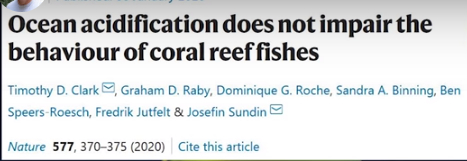Die kalte Sonne’s latest video here looks at a recent paper on ocean acidification and the impact it had been claimed to have on the behavior of coral fish.
Lower ocean pH level affecting fish?
Earlier research beginning in 2009 by Prof. Philip Munday and Danielle Dixon of Australia’s James Cook University suggested that that “ocean acidification” was having dire effects on fish behavior, thus prompting the IPCC to claim in a 2014 report that it could lead to “profound consequences for marine diversity” and the media to put out a series of climate doomsday reports.
But the alarming research results of Munday and Dixon have since been seriously challenged by a group led by fish physiologist Timothy Clark of Deakin University in Geelong, Australia in a recent paper:
A year ago the researchers published the results of a comprehensive 3-year study in the journal of Nature in a paper titled: “Ocean acidification does not impair the behaviour of coral reef fishes“.
The paper’s abstract:
Coral reef fishes are predicted to be especially susceptible to end-of-century ocean acidification on the basis of several high-profile papers4,5 that have reported profound behavioural and sensory impairments—for example, complete attraction to the chemical cues of predators under conditions of ocean acidification. Here, we comprehensively and transparently show that—in contrast to previous studies—end-of-century ocean acidification levels have negligible effects on important behaviours of coral reef fishes, such as the avoidance of chemical cues from predators, fish activity levels and behavioural lateralization (left–right turning preference). Using data simulations, we additionally show that the large effect sizes and small within-group variances that have been reported in several previous studies are highly improbable. Together, our findings indicate that the reported effects of ocean acidification on the behaviour of coral reef fishes are not reproducible, suggesting that behavioural perturbations will not be a major consequence for coral reef fishes in high CO2 oceans.”
Die kalte Sonne reports on the new findings, noting that Clark et al repeated the trials by Munday and were unable to reproduce the results:
A team of seven scientists led by Timothy Clark of the Australian Deakin University published in the renowned journal Nature an analysis with devastating criticism of the dramatic scenarios of the Munday group.” […]
“The group of critics also expect no negative consequences in the behaviour of the coral fish also at high levels of CO2 at the end of the 21st century.”
The James Cook University however, denies sloppy science was done by Munday and his team of scientists.
The James Cook University has been caught up in controversy, especially over the firing of researcher Prof. Dr. Peter Ridd, who claims he was sacked for expressing unpopular views.
Also read more on Munday’s controversial research here.






[…] https://notrickszone.com/2021/06/27/james-cook-university-researchers-refuted-ocean-acidification-do… […]
Sea Life thrived and Coral Developed when CO2 was much much higher. This graphic shows just how much higher CO2 was when most sea life developed.
https://imgur.com/E5TmINz
James “Cook the figures” University.
The Great Barrier Reef has been declared “about to die” for year after year since 1971, usually about the time that Government grants are decided.
First of all you have t set aside the whole nonsense of “acidification” before you consider the competing arguments. The intial study is from James Cook University. Enough said really.
The oceans are not “acidifying”. Sea water is basic. It may become less basic (slightly) but it would first have to become fresh water (neutral) before it could begin to become acidic, and that won’t happen before the Sun expands and boils away all of the water in the far distant future.
[…] Reposted from NoTricksZone […]
[…] Reposted from NoTricksZone […]
yarpos and Senex, you are right on the mark –
The notion of “ocean acidification” is a scam devised by scientists who are hungry for publicity and research grants, crooked politicians, “environmentalist” NGO scammers, and journalists who promote sensational stories because they know that “fear sells”.
All these people, each for their own reasons, are part of a coordinated scaring effort to extort political support, additional taxes and donations from the public.
There is no way CO2, a mere trace gas in the atmosphere, could ever change the PH of the oceans in a noticeable way, or even a detectable way, because the oceans’ mass is about 1.4 quintillion tonnes, and the mass of the atmosphere is just a little over 5 quadrillion tonnes.
Tip: A quintillion is 1,000 times a quadrillion.
[…] Reposted from NoTricksZone […]
[…] Reposted from NoTricksZone […]
[…] Reposted from NoTricksZone […]